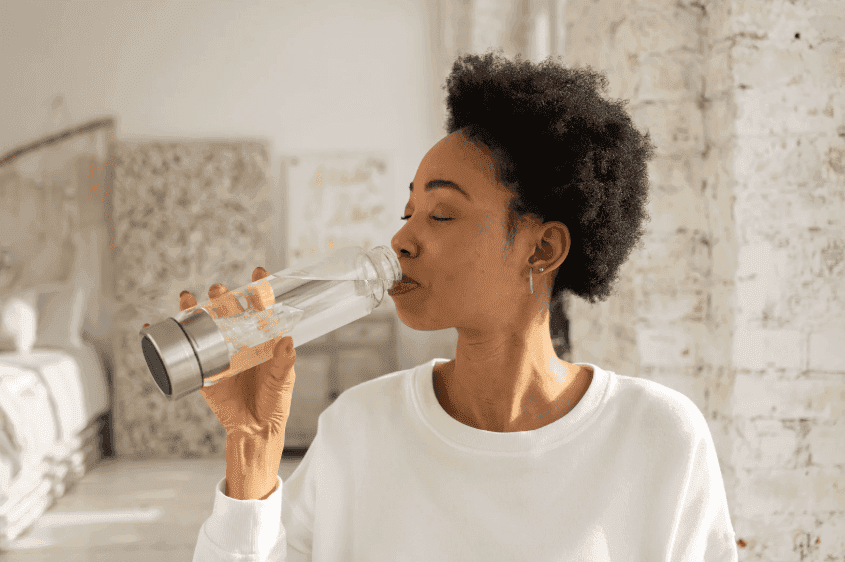How to hydrate yourself the healthy way
Staying hydrated is essential, as our bodies are composed of about 60% water, and we cannot survive without it for more than a few days. Proper hydration supports nutrient transport, energy production, detoxification, digestion, and even skin health. It also helps prevent muscle cramps and urinary tract infections.


Pilar Manzanaro
5 min
Trying to Conceive
Article
What Should You Drink?
The best hydration choice is simple—water! Avoid sugary juices, fizzy drinks, and artificial sports beverages. To stay hydrated without adding unnecessary calories or toxins, opt for water and herbal teas.
Best Water Choices:
- Tap Water: Readily available and affordable, though it may contain impurities like lead or industrial chemicals. Enhance the taste by adding lemon, cucumber, or mint.
- Bottled Water: Convenient but often packaged in plastic containing Bisphenol A (BPA), which may disrupt hormones. If choosing bottled water, opt for glass bottles whenever possible.
- Filtered Water: A top choice for removing contaminants while retaining essential minerals. Use a BPA-free reusable bottle for gym or work and wash it regularly to prevent bacteria buildup.
Drinks to Limit:
- Flavored Water & Bottled Juices: Often high in sugar, preservatives, and artificial additives.
- Alcohol: Causes dehydration, affects hormonal balance, and can lead to weight gain. Drink in moderation, choose quality beverages, and alternate alcoholic drinks with water.
- Coffee & Tea: Contain caffeine, a diuretic, which may lead to dehydration if consumed in excess. Green tea and organic coffee contain antioxidants, so they can be enjoyed in moderation without sugar or sweeteners.
- Infusions: Herbal teas and warm infusions are excellent alternatives for hydration, especially in colder months. Avoid adding sugar or artificial sweeteners.
Hydrating Foods
You can also increase hydration through food! Fresh fruits, vegetables, salads, and soups contribute to your daily fluid intake. Water-rich foods like watermelon, cucumbers, and oranges help maintain hydration naturally.
How Much Water Do You Need?
There’s no universal rule, as hydration needs vary based on factors like activity level, climate, and individual metabolism. Signs of dehydration include headaches, fatigue, poor concentration, constipation, and dark-colored urine. Ideally, urine should be a pale yellow shade, similar to straw.
- Hot Climates & Exercise: Increase water intake to replace fluids lost through sweat.
- Pregnancy & Breastfeeding: Extra fluids are necessary due to increased blood volume and milk production.
- Illness & Recovery: During vomiting or diarrhea, drink fluids frequently to prevent dehydration.
When Should You Drink Water?
- Morning: Start your day with a glass of water to rehydrate after sleep. A warm mug of water with lemon supports digestion and detoxification.
- Throughout the Day: Sip water regularly instead of drinking large amounts at once. Respond to thirst cues and adjust intake based on activity levels.
- Before Meals: Sometimes, thirst is mistaken for hunger. Drinking a glass of water before eating can prevent overeating and support digestion.
Final Thoughts
Hydration is essential for optimal health, energy, and well-being. By choosing pure water, herbal teas, and hydrating foods, you can keep your body functioning at its best. Listen to your body, drink regularly, and enjoy the benefits of proper hydration!

Få adgang til hundredvis af fertilitetseksperter, videnskabeligt underbygget indhold og et personligt program, der er designet til dine unikke behov.
Gratis fertilitetsguide og værktøjer
Tilmeld dig for at få gratis ekspertværktøjer til fertilitet, letforståelig vejledning, sunde opskrifter, opdateringer og meget mere! Vi ses i din indbakke!
